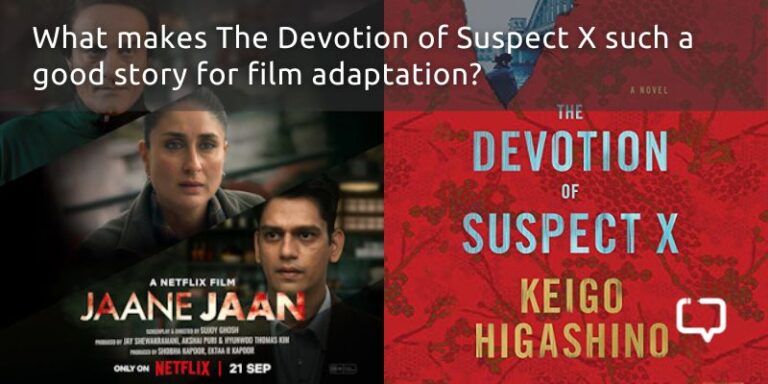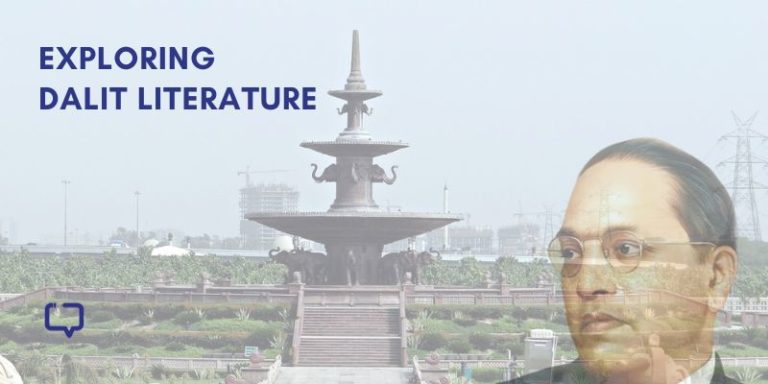Cinema has always been a mirror reflecting the society it represents. And the influence of cinema on society and vice versa is perhaps more fleshed out in India. From the complexities of caste discrimination to the nuances of LGBTQ+ rights, filmmakers have, time and time again, challenged norms and sparked conversations.
Today, we look at a selection of movies on Indian social movements that push boundaries and critique society. Whether it’s through historical drama, legal thrillers, or personal stories, these films go beyond entertainment, inspiring change and provoking thought. These cinematic gems on Indian social movements have highlighted pressing social concerns and contributed to an ongoing discourse on justice, equality, and human rights in India.
Must-Watch Movies on and Around Indian Social Movements
From the revolutionary tales of historical struggles to contemporary issues of personal dignity and social justice, the films on Indian social movements in this article are excellent catalysts for conversation and change. If you think we’ve missed any, let us know in the comments below!
1. Manthan (1976)
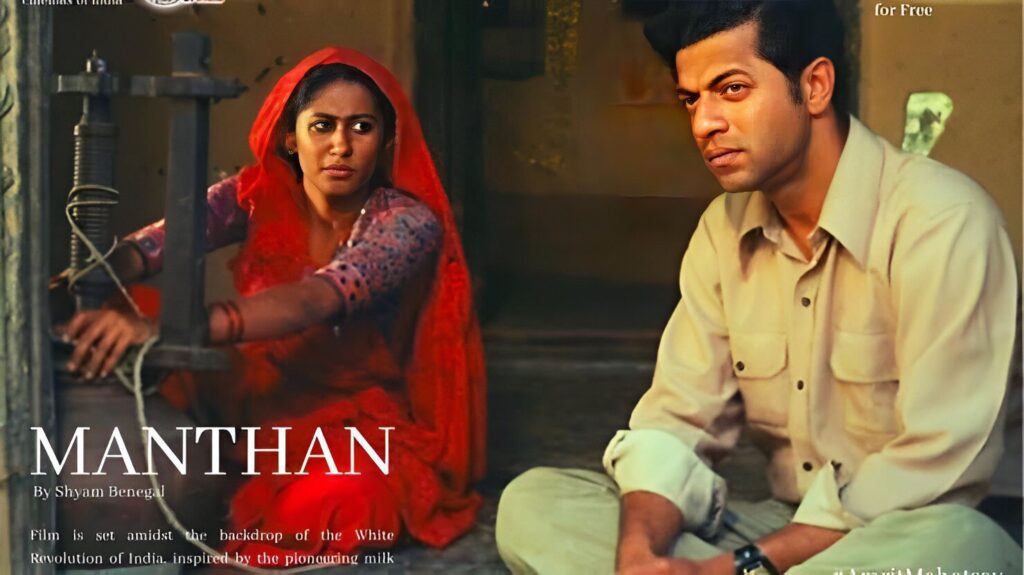
We can’t have a list of movies on Indian social movements and not include Manthan, directed by Shyam Benegal, a landmark depiction of India’s White Revolution. In rural Gujarat, Dr. Rao (Girish Karnad), a veterinarian, also known as the “Father of the White Revolution,” steps in to help farmers form a milk cooperative, breaking free from the control of exploitative middlemen.
Recommended Reading: Resistance Literature in India: Through the Years
Interestingly, Manthan was India’s first crowdfunded film, supported by 500,000 farmers, each contributing Rs 2. The film’s realistic portrayal of rural life and collective action earned it the National Film Award for Best Feature Film in Hindi.
2. Bandit Queen (1994)

Highlighting a pivotal chapter in Indian social movements, the film delves into the life of one who dared to defy the status quo. Bandit Queen, directed by Shekhar Kapur, tells the raw and powerful story of Phoolan Devi, a low-caste woman who became a feared bandit leader. Based on the book India’s Bandit Queen: The True Story of Phoolan Devi by Mala Sen, the film takes you through Phoolan’s brutal life of abuse and oppression and her rise as a bandit.
It doesn’t shy away from the harsh realities of caste-based violence, with moments like the infamous Behmai massacre, where Phoolan allegedly led a deadly act of revenge against upper-caste men. It’s a hard-hitting portrayal of gender and caste oppression that remains unflinchingly honest in its depiction of India’s deep social divides.
3. The Legend of Bhagat Singh (2002)

The third title in our list of movies on Indian social movements is a film by Rajkumar Santoshi. The Legend of Bhagat Singh tells the story of one of India’s most iconic revolutionaries, Bhagat Singh. Ajay Devgn steps into the role of Singh, who, deeply affected by British colonial rule, chooses the path of armed resistance in the fight for independence.
The film highlights key events like the Jallianwala Bagh massacre and Singh’s role in the assassination of British officer John Saunders. It also thoughtfully contrasts Singh’s revolutionary methods with Gandhi’s peaceful approach. It eventually led to Singh’s execution in 1931, a moment that forever sealed his legacy as a martyr for India’s freedom.
4. Water (2005)
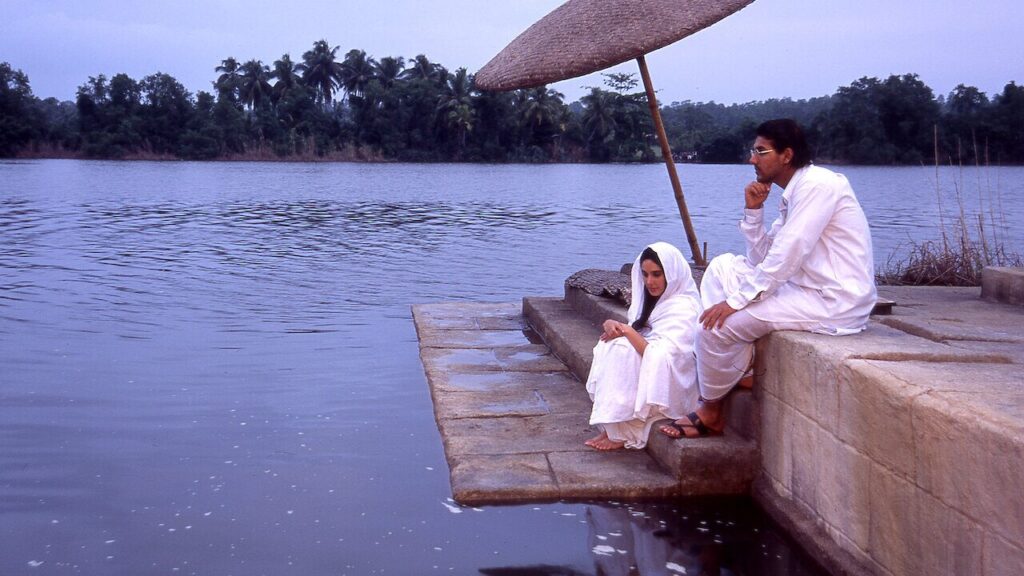
The next stop in our list of films set around Indian social movements is Water, a Deepa Mehta directorial. Set in 1938 colonial India, it takes a hard look at the lives of Hindu widows through the eyes of Chuyia, an eight-year-old girl forced into a widow’s ashram after the death of her elderly husband.
Recommended Reading: Indian Feminist Literature Through the Ages
The film goes deep into the harsh realities of child marriage, misogyny, and the isolation widows faced, exposing the oppressive social traditions of the time. The film also brings attention to the widow reform movement, questioning the oppressive norms that kept these women in lives of servitude. In 2006, Bapsi Sidhwa also adapted the film into a novel of the same name.
5. Satyagraha (2013)

The director behind this movie shall feature multiple times in our list of movies on Indian social movements. Prakash Jha’s Satyagraha taps into the heart of India’s fight against corruption with clear nods to the real-life movement led by Anna Hazare and the push for the Jan Lokpal Bill. Amitabh Bachchan plays Dwarka Anand, a Gandhian figure reminiscent of Hazare, who takes a stand against corruption after his son’s death at the hands of corrupt officials. Ajay Devgn’s character, Manav, represents the voice of the younger generation, frustrated yet determined to drive change.
Satyagraha also shows how social media and public protests are shaping modern Indian social movements. With a sharp critique of corruption, the film also shows the importance of the struggle for social reform, carried by standout performances from Bachchan and Manoj Bajpayee, who plays a scheming politician.
6. Aarakshan (2011)
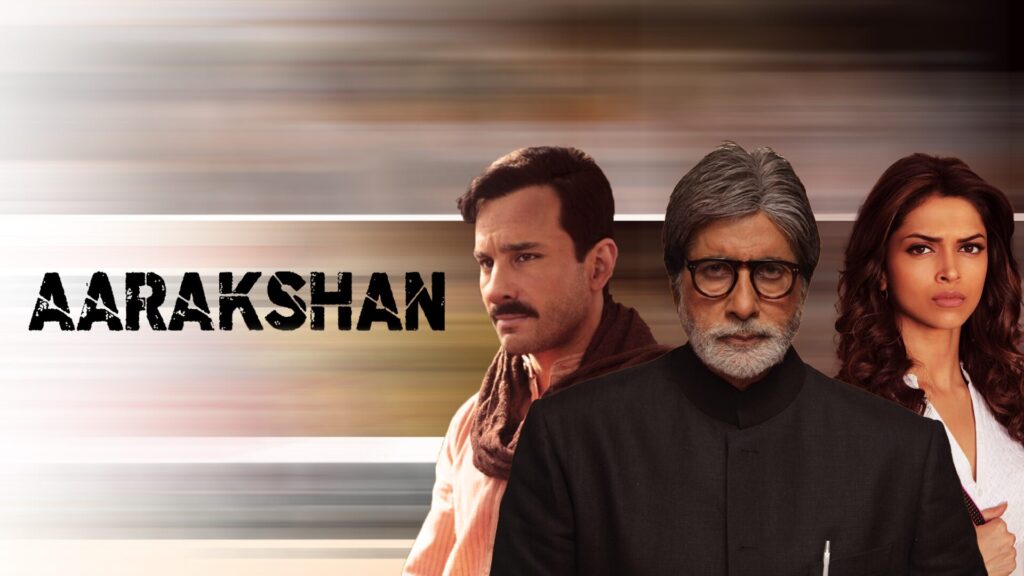
The next part of our selection of movies on Indian social movements is another Prakash Jha venture, Aarakshan, which focuses on the heated debate around caste-based reservations in India. Amitabh Bachchan plays Dr Prabhakar Anand, a respected college principal who stands firm on principles. Saif Ali Khan plays Deepak, a talented student from a lower caste who still faces discrimination despite his abilities.
The story starts against the backdrop of the Indian Supreme Court’s decision to uphold reservations for Other Backward Classes (OBCs), igniting a fierce debate between supporters and critics of the policy. The film also touches on how education can drive social mobility and the growing commercialization of the education sector. While Aarakshan earned praise for its performances, it stirred up its own share of controversy, with some states temporarily banning the film for its take on the reservation system.
7. Mangal Pandey: The Rising (2005)
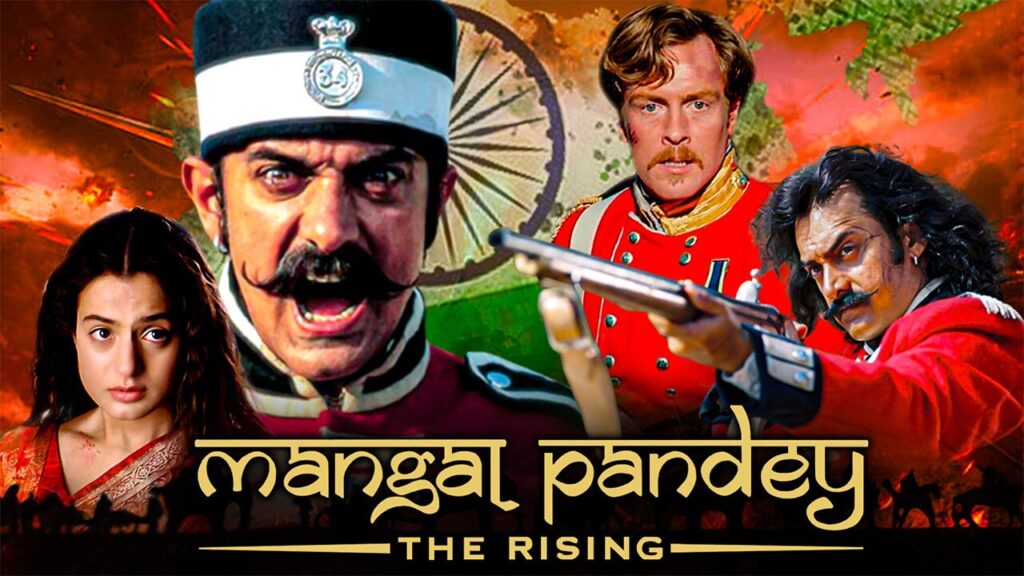
One of the earliest Indian social movements, the 1857 rebellion, fought against the British Empire, was a changing point in the Indian struggle for independence. Directed by Ketan Mehta, Mangal Pandey: The Rising is a historical biopic that takes you right into the heart of India’s 1857 rebellion. Aamir Khan plays Mangal Pandey, the sepoy whose actions helped spark what became India’s First War of Independence. The story shows Pandey’s growing frustration with British exploitation, especially the infamous greased cartridges that crossed religious lines.
Recommended Reading: Indian Literature Post Independence: A throwback
The film traces Pandey’s journey from a loyal soldier to a revolutionary, focusing on his growing disillusionment with British exploitation, especially the controversial use of greased cartridges that violated religious beliefs. At the core of the film is the complex relationship between Pandey and his British officer, Captain William Gordon (played by Toby Stephens), which adds a personal layer to the larger historical events.
8. Jai Bhim (2021)
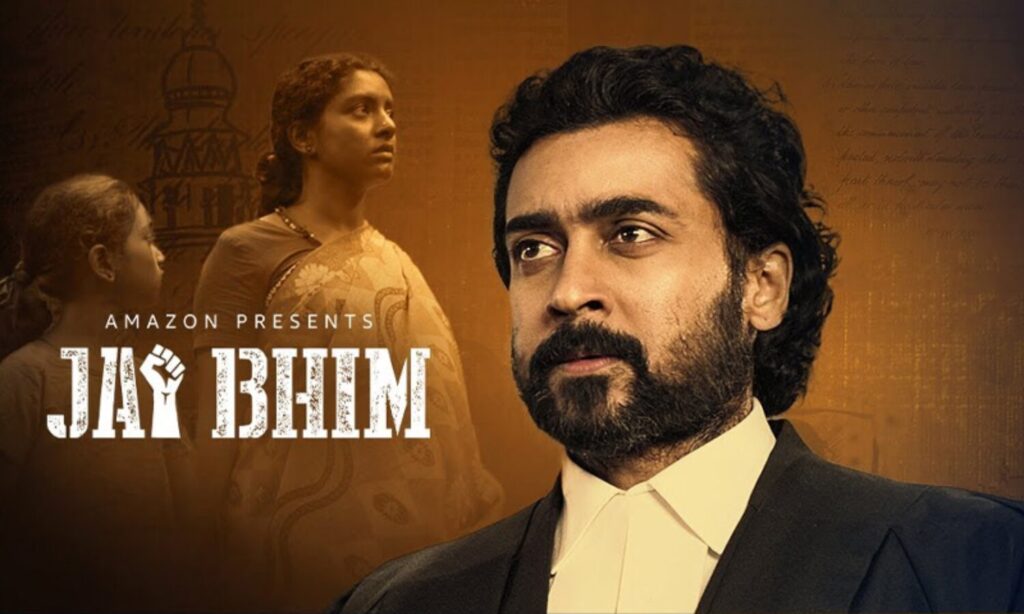
There are few movies on Indian social movements centring around anti-caste messages that have been as impactful as this. Jai Bhim, directed by T.J. Gnanavel, depicts the harsh realities of caste-based discrimination and police brutality faced by the marginalized Irular tribe. Set in 1995 and inspired by true events, the story follows Sengeni (Lijomol Jose), whose husband, Rajakannu, is wrongly arrested and tortured by the police before disappearing. In a desperate bid for justice, she seeks help from lawyer Chandru, played by Suriya, who takes on her case and battles against a deeply corrupt system.
The film doesn’t shy away from showing the harsh reality of how the law treats lower-caste individuals. With its unflinching portrayal of caste oppression and emotional courtroom battles, Jai Bhim stands out for its hard-hitting narrative. It remains one of the most impactful anti-caste films in Tamil cinema and an important chapter in movies on Indian social movements.
9. Badhaai Do (2022)
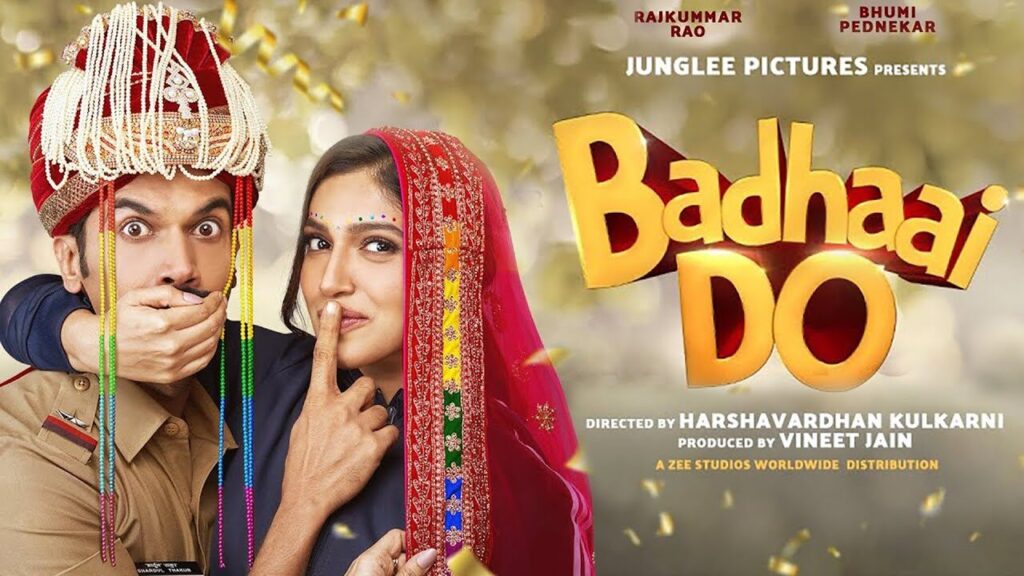
Our next stop in the list of films on Indian social movements was critically praised for its depth and nuance, and rightly so. Directed by Harshavardhan Kulkarni, Badhaai Do is a refreshing look at LGBTQ+ representation in Bollywood. It centres around Shardul, a closeted gay policeman played by Rajkummar Rao, and Sumi, a lesbian teacher portrayed by Bhumi Pednekar. They enter into a “lavender marriage” to fend off the societal pressure to settle down traditionally, all while secretly navigating their identities.
When making movies on Indian social movements, incorporating comedic themes requires a delicate balance. Badhaai Do brilliantly blends humour with the serious realities LGBTQ+ folks face, from the loneliness of living in secrecy to the societal pressure to conform. Alongside the personal struggles, the film also touches on broader issues like adoption rights and housing discrimination, making it an important step forward for queer storytelling in Indian cinema.
10. Bhavni Bhavai (1980)

The next pitstop for our selection of movies around Indian social movements, Bhavni Bhavai, a directorial by Ketan Mehta, uses folklore and satire to critique caste-based oppression. Set in a medieval kingdom gripped by drought, the film follows a young boy’s fight against the oppressive caste system. Through a mix of allegory and dark humour, the film looks at the subjugation of lower castes, particularly the Harijans (Dalits), under an unjust social hierarchy.
Unique is the film’s circular narrative, which weaves traditional Bhavai folk theatre with contemporary issues like untouchability. It cleverly draws parallels between historical oppression and modern struggles. Bhavni Bhavai was celebrated for its bold storytelling, earning the Nargis Dutt Award for Best Feature Film on National Integration.
11. Shubh Mangal Zyada Saavdhan (2020)
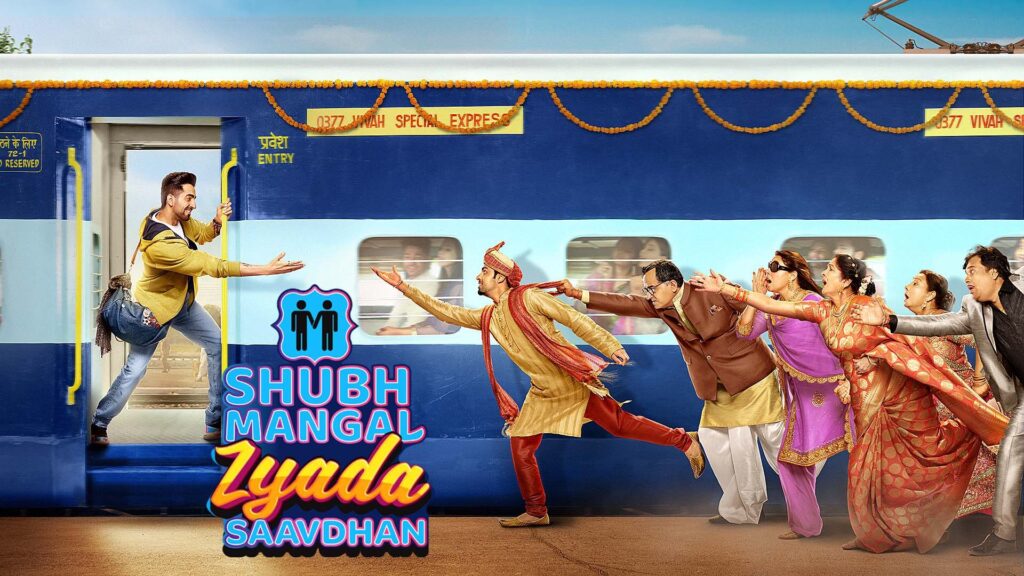
Among recent movies on Indian social movements, there are several with LGBTQ+ representation, though the mainstream-ification is yet to solidify. Our next pick was a major move in the right direction. Shubh Mangal Zyada Saavdhan, directed by Hitesh Kewalya, takes a bold step in Bollywood by addressing gay rights through a lighthearted romantic comedy. Ayushmann Khurrana plays Kartik, and Jitendra Kumar takes on the role of Aman—two men deeply in love who face resistance from Aman’s conservative family.
Set in a small-town backdrop, this film uses humour to tackle homophobia and traditional expectations, including a rare same-sex kiss for Bollywood. Beneath the comedy, the film strikes a chord by portraying the discrimination the LGBTQ+ community endures, pushing for equality and sparking conversations about inclusion and acceptance in India.
12. Super Deluxe (2019)
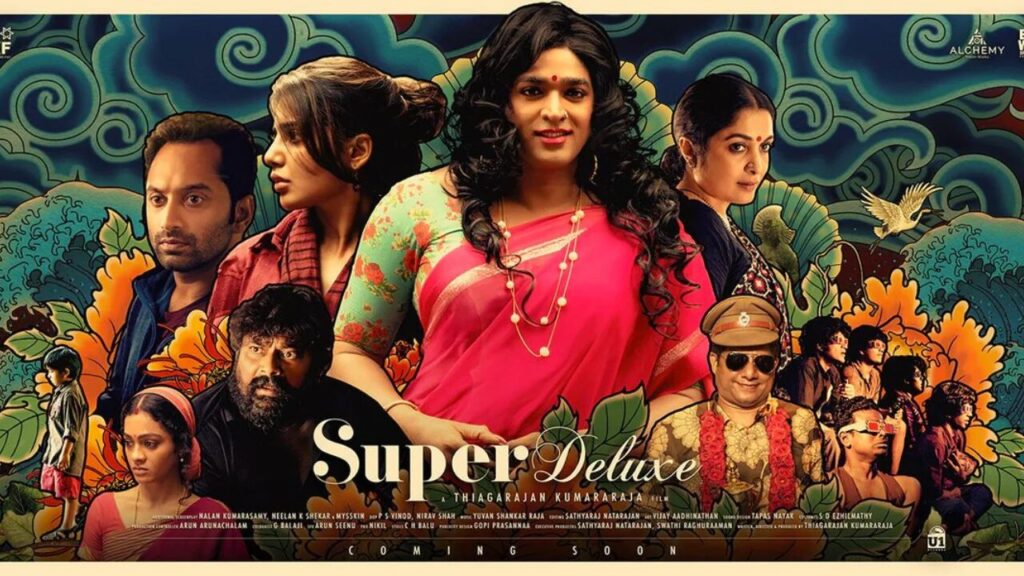
One of the most nuanced and memorable performances to have come out of recent movies on Indian social movements centring LGBTQ+ issues, Super Deluxe, directed by Thiagarajan Kumararaja, features Vijay Sethupathi as Shilpa, a transgender woman returning to her family after transitioning. The film boldly tackles the discrimination transgender individuals face, with Shilpa’s story highlighting societal rejection and the emotional toll it takes.
Sethupathi’s sensitive portrayal of Shilpa, especially in scenes of police humiliation and her bond with her son, stands out for its emotional depth. Super Deluxe challenges societal norms while sparking important conversations about gender identity in Indian cinema.
13. Naanu Avanalla… Avalu (2015)
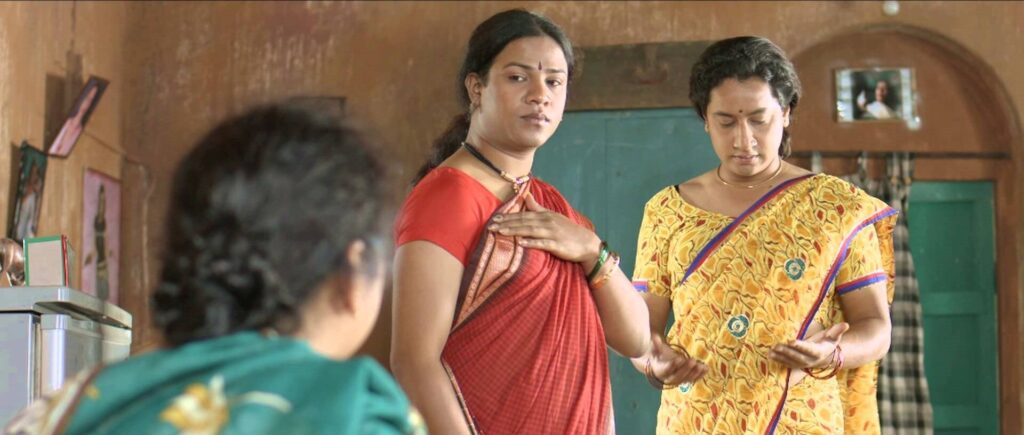
Our next pick of movies on Indian social movements is a personal story. Naanu Avanalla… Avalu, a B.S. Lingadevaru film, is based on the autobiography I Am Vidya by Living Smile Vidya. It’s the story of Madesha, a transgender woman who transitions to Vidya, highlighting the struggles faced by the transgender community, from family alienation to societal rejection.
Recommended Reading: Vellai Mozhi by Revathi: A rainbow of hope on a blank canvas
The film shows Vidya’s journey, her gender-affirming surgery, and her fight for dignity against discrimination. Sanchari Vijay’s portrayal of Vidya won him the National Award for Best Actor, and the film was critically acclaimed for breaking stereotypes and spotlighting transgender issues in mainstream cinema.
14. Kaala (2018)
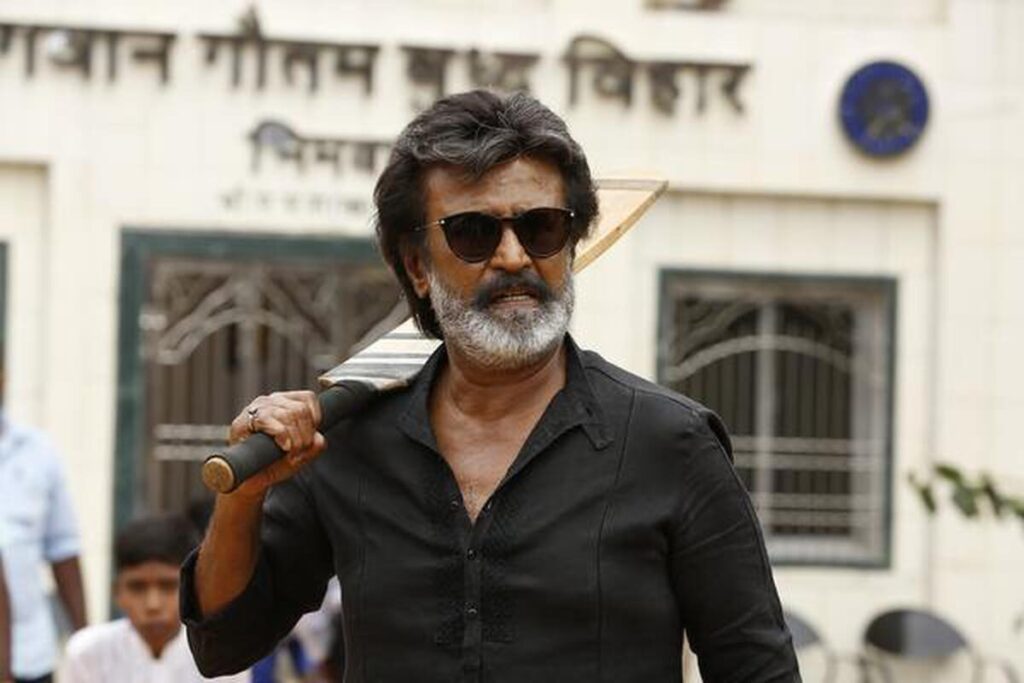
If you thought commercial cinema and Indian social movements couldn’t be used in one sentence, think again! Directed by Pa. Ranjith, Kaala is a socio-political drama starring Rajinikanth as Karikaalan (Kaala), a leader fighting for the rights of marginalized communities in the slums of Dharavi, Mumbai. The film pits Kaala against corrupt politicians and land mafias, led by Hari Dada (Nana Patekar), as they battle over land ownership.
The story is a powerful allegory for Dalit rights, with Kaala’s black attire symbolizing resistance against the oppressive upper-caste establishment. The film highlights the importance of land as a fundamental right, urging the oppressed to claim what’s theirs rather than accept it as charity. Through layers of social critique, Kaala has strong themes of caste discrimination, poverty, land exploitation, community solidarity and women’s activism woven throughout.
15. Fandry (2013)

The next stop in our list of films on Indian social movements comes from Marathi cinema. Nagraj Manjule’s Fandry grimly depicts caste-based discrimination through the eyes of Jabya, a Dalit boy in rural Maharashtra. His love for an upper-caste girl, Shalu, is central to the story, but it’s the societal barriers that truly come to the forefront.
The film’s title, Fandry, meaning “pig” in Marathi, symbolizes the derogatory roles imposed on Dalits. Jabya’s forced participation in menial tasks and the constant mockery from upper-caste villagers show the deep-rooted oppression that exists yet in our society. Through Jabya’s resistance and eventual outburst, the film addresses the deep-rooted trauma and indignities endured by the Dalit community while critiquing the illusion of a caste-free modern India.
16. Pariyerum Perumal (2018)

The 16th title in our list of movies set around Indian social movements is Pariyerum Perumal, directed by Mari Selvaraj, tackling caste-based oppression head-on through the journey of Pariyan, a Dalit law student. His friendship with Jo, an upper-caste girl, triggers relentless humiliation and violence, presenting the brutal realities of caste discrimination in rural India in all its shades.
An unforgettable scene involves Pariyan being dehumanized by an upper-caste man, but beneath the grim reality is a story of resilience. Through his connection with Karuppi, his dog, and his journey from shame to empowerment, Pariyerum Perumal offers a message of defiance, emphasizing that the fight against caste oppression is one of dignity and resistance, not violence.
17. Kaalbela (2009)

Our next selection in the list of films on Indian social movements comes from Bangla cinema. Directed by Goutam Ghose, Kaalbela takes you to the turbulent era of the 1970s Naxalite movement in Bengal. Based on Samaresh Majumdar’s eponymous novel, the film follows Animesh Mitra, a young man from Jalpaiguri who moves to Kolkata for his studies but gets swept up in the revolutionary fervour of the Naxalite cause.
As Animesh becomes deeply involved in the movement, the film shows the idealism that fuels his political journey, alongside his eventual disillusionment as violence and chaos take over. His relationships, especially with Madhabilata and Tridip, crumble under the weight of political radicalization, showing how the socio-political turmoil goes beyond our public lives. The movie also starkly portrays the oppressive response by the state, ultimately leading to tragic consequences for Animesh and his comrades.
18. Pink (2016)
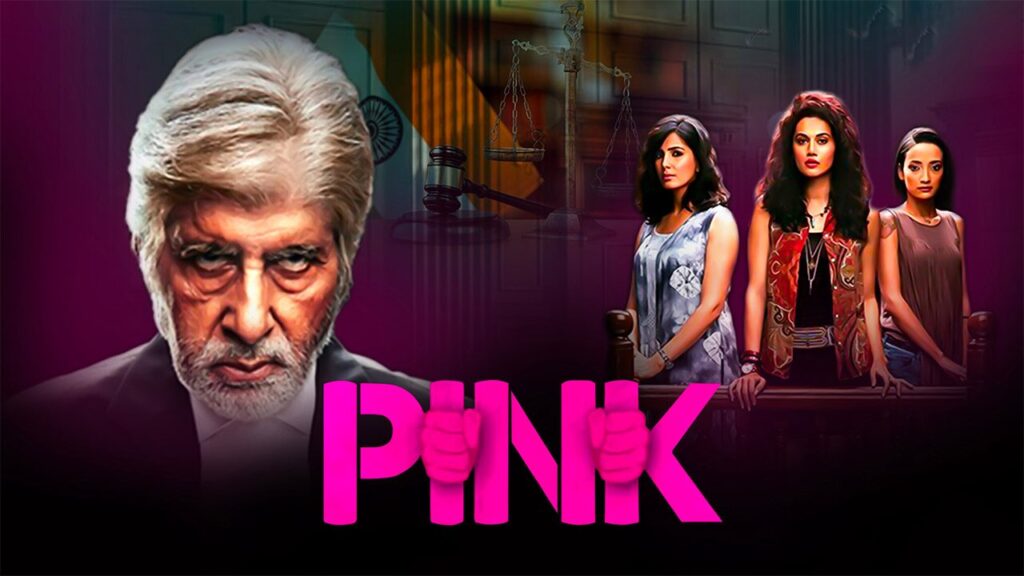
Our next pick of movies on Indian social movements is one of the most important movies to have come out of Bollywood in recent years. Pink, an Aniruddha Roy Chowdhury directorial, puts the spotlight on the concept of consent and its importance, a trailblazer in India’s #MeToo movement. The story follows three women accused of a crime after defending themselves from sexual assault. Amitabh Bachchan stars as a retired lawyer who takes up their case, famously asserting that “No means no,” a line that resonated deeply and became a powerful slogan for consent awareness in India.
The film bravely confronts patriarchal attitudes, challenging the harmful practice of blaming victims for their assaults and emphasizing that consent is an explicit “yes” and not some ambiguous cues. By focusing on these critical issues, Pink opened up essential conversations about sexual harassment and women’s rights, setting the stage for the broader #MeToo discussions that followed. Among films on Indian social movements, this is a must-watch!
19. Chakravyuh (2012)
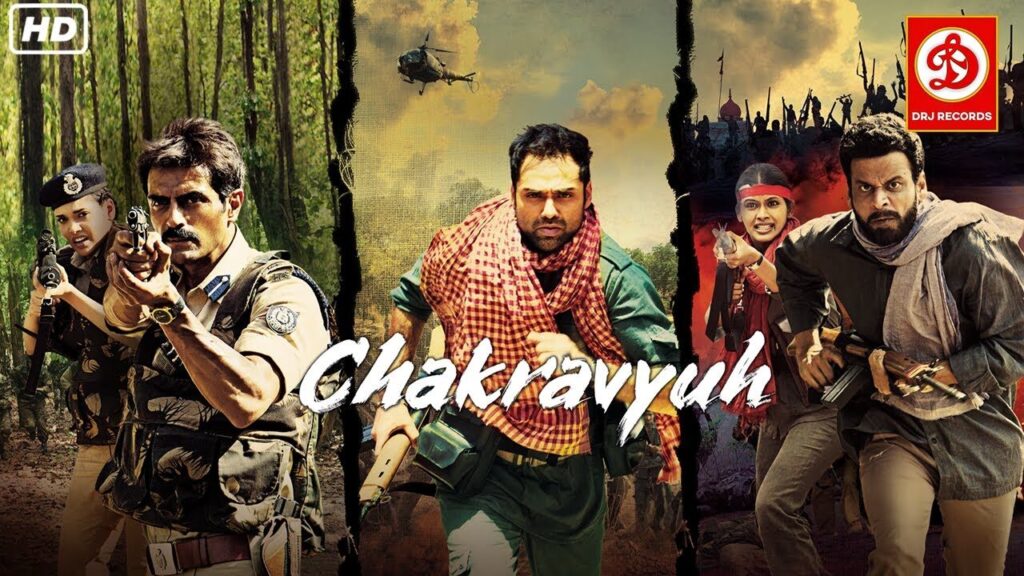
We have another Prakash Jha directorial in our list of films on Indian social movements! Told ya! Chakravyuh, a political action thriller, explores the many nuances of the Naxalite movement in India. The film shows the conflict between the government and the Naxalite insurgency, focusing on the socio-economic issues that fuel the movement, such as industrialists’ exploitation of tribal lands in collusion with politicians.
Recommended Reading: Language Politics in India: Regional Protests and Their National Implications
We follow two friends, Adil (Arjun Rampal), a police officer, and Kabir (Abhay Deol). The latter infiltrates the Naxal group as an undercover agent to support Adil’s mission. However, Kabir becomes sympathetic to the Naxalite cause after witnessing the government’s atrocities against the tribal population. The film raises questions about the root causes of Naxalism, including corruption, land rights, and the exploitation of marginalized communities.
20. Padman (2018)

Many important conversations are still considered taboo in our society, and such movies on Indian social movements are necessary to change that. R. Balki’s Padman is based on the true story of Arunachalam Muruganantham, a social entrepreneur from Tamil Nadu who revolutionized menstrual hygiene in rural India by inventing a low-cost sanitary pad-making machine. Akshay Kumar plays Lakshmikant Chauhan, a character modelled after Muruganantham. The film shows his journey of overcoming societal taboos around menstruation to create affordable sanitary napkins for women.
Balki depicts the challenges Lakshmikant faces, from being ridiculed by his community to being ostracized by his family. His dedication to addressing the menstrual hygiene crisis in rural India empowers women to lead healthier lives. Padman is a great conversation starter around menstrual health, breaking taboos and encouraging more open discourse on a subject often seen as shameful in many parts of India.
These are just 20 movies on Indian social movements, but I’m sure there are many more. Comment below and share your favourite titles in the comments below!














